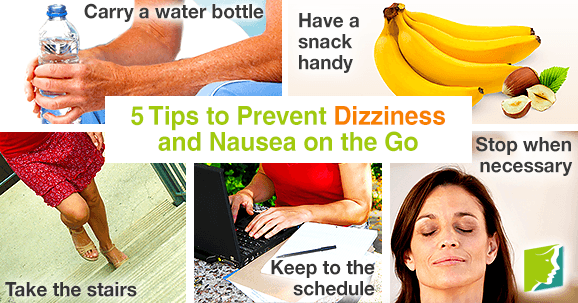Responsibilities with work, family, and friends can quickly whip a quiet life into hyper-speed, and everyone is constantly on the go. For those who suffer from chronic dizziness and nausea, a busy, hectic life can pose problems. But certain steps can be taken to prevent symptoms on a daily basis, wherever you are. Read on for five tips on how you can start today.
Carry a Water Bottle
Hydration is a key component of overall health, but it is particularly important when trying to avoid dizziness and nausea. Make sure your busy schedule doesn't prevent you from staying hydrated. Carrying a reusable water bottle is a great way to guarantee you have water available at all times. Look for one with a secure lid that keeps liquids off keyboards at work and is portable enough for the car so that it's easy to keep with you throughout the day.
Have a Snack Handy
One common cause of chronic dizziness and nausea is nutritional deficiency - especially for those who are always on the go and don't always have time to eat regular, balanced meals. Potassium, manganese, and omega-3 fatty acids are all essential to preventing dizziness and nausea, and they can easily be found in portable snack foods such as fruits, nuts, and seeds. Bananas and almonds are great, filling, easy-to-carry options.
Take the Stairs
It's not easy to carve out time for a full aerobics class with all the activities of daily life, but the little things everyone does in between scheduled events can add up to improve health. Dizziness and nausea are sometimes symptoms of lack of movement, so try to include exercise during the day to counteract sedentary time. Substituting the stairs for the elevator or biking instead of driving are great places to start.
Keep to the Schedule
Dizziness and nausea can come on at any time, but the stress that may trigger them is something that everyone can control. If you are busy, try to keep your schedule tight so that unknown factors don't arise and cause unneeded stress. It's helpful to write everything down so that plans feel more concrete.
Stop When Necessary
Hectic schedules force the most people to be on the go, but health concerns should take precedence over other things. Chronic dizziness and nausea are serious conditions, and it's important to know when to take a break, sit down, and stabilize your system. When symptoms start to kick in, try finding a focal point for the eyes and breathing steadily and deeply.
Suffering from episodes of dizziness and nausea doesn't have to stop you from living your life - you can maintain equilibrium and a healthy pace through awareness and a healthy lifestyle. Try some of the strategies above to adjust your daily life for dizziness and nausea prevention.
Learn more about on how to manage this menopausal symptom by following the links below.
Sources
- Harvard Health. (2015). 7 ways to keep stress-and blood pressure-down. Retrieved February 1, 2016, from http://www.health.harvard.edu/heart-health/7-ways-to-keep-stress-and-blood-pressure-down
- National Health Service UK. (2015). Dizziness (Lightheadedness). Retrieved February 1, 2016, from http://www.nhs.uk/conditions/dizziness/Pages/Introduction.aspx
- National Health Service UK. (2015). Vitamins and minerals. Retrieved February 1, 2016, from http://www.nhs.uk/Conditions/vitamins-minerals/Pages/Other-vitamins-minerals.aspx




